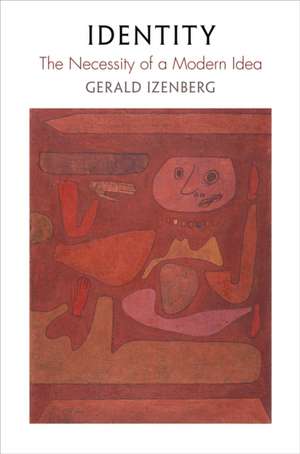Identity – The Necessity of a Modern Idea: Intellectual History of the Modern Age
Autor Gerald Izenbergen Limba Engleză Paperback – 7 mar 2019
At the same time the book is an argument for the validity and indispensability of identity, properly understood. Identity was not a concept before the twentieth century because it was taken for granted. The slaughter of World War I undermined the honored identities of prewar Europe and, as a result, the idea of identity as something objective and stable was thrown into question at the same time that people began to sense that it was psychologically and socially necessary. We can't be at home in our bodies, act effectively in the world, or interact comfortably with others without a stable sense of who we are. Gerald Izenberg argues that, while it is a mistake to believe that our identities are givens that we passively discover about ourselves, decreed by God, destiny, or nature, our most important identities have an objective foundation in our existential situation as bodies, social beings, and creatures who aspire to meaning and transcendence, as well as in the legitimacy of our historical particularity.
Din seria Intellectual History of the Modern Age
-
 Preț: 185.35 lei
Preț: 185.35 lei -
 Preț: 243.50 lei
Preț: 243.50 lei - 11%
 Preț: 443.05 lei
Preț: 443.05 lei -
 Preț: 198.00 lei
Preț: 198.00 lei -
 Preț: 203.03 lei
Preț: 203.03 lei - 11%
 Preț: 474.94 lei
Preț: 474.94 lei - 11%
 Preț: 502.86 lei
Preț: 502.86 lei -
 Preț: 466.13 lei
Preț: 466.13 lei - 11%
 Preț: 441.89 lei
Preț: 441.89 lei - 11%
 Preț: 562.11 lei
Preț: 562.11 lei - 11%
 Preț: 624.77 lei
Preț: 624.77 lei -
 Preț: 464.00 lei
Preț: 464.00 lei -
 Preț: 313.45 lei
Preț: 313.45 lei - 23%
 Preț: 427.99 lei
Preț: 427.99 lei - 5%
 Preț: 426.73 lei
Preț: 426.73 lei - 9%
 Preț: 683.85 lei
Preț: 683.85 lei - 23%
 Preț: 526.63 lei
Preț: 526.63 lei - 23%
 Preț: 527.93 lei
Preț: 527.93 lei - 23%
 Preț: 524.72 lei
Preț: 524.72 lei - 23%
 Preț: 489.49 lei
Preț: 489.49 lei - 23%
 Preț: 427.99 lei
Preț: 427.99 lei - 23%
 Preț: 464.27 lei
Preț: 464.27 lei
Preț: 330.24 lei
Nou
Puncte Express: 495
Preț estimativ în valută:
63.21€ • 66.41$ • 53.12£
63.21€ • 66.41$ • 53.12£
Carte disponibilă
Livrare economică 19 februarie-05 martie
Preluare comenzi: 021 569.72.76
Specificații
ISBN-13: 9780812224535
ISBN-10: 0812224531
Pagini: 552
Dimensiuni: 164 x 231 x 32 mm
Greutate: 0.84 kg
Editura: MT – University of Pennsylvania Press
Seria Intellectual History of the Modern Age
ISBN-10: 0812224531
Pagini: 552
Dimensiuni: 164 x 231 x 32 mm
Greutate: 0.84 kg
Editura: MT – University of Pennsylvania Press
Seria Intellectual History of the Modern Age
Cuprins
Introduction. The New "Discourse" of Identity
Chapter 1. Identity Becomes an Issue: European Literature Between the World Wars
Chapter 2. The Ontological Critique of Identity: Heidegger and Sartre
Chapter 3. Identity Becomes a Word: Erik Erikson and Psychological Identity
Chapter 4. Social Identity and the Birth of Identity Politics, 1945-1970
Chapter 5. Collective Identities and Their Agendas, 1970-2000
Chapter 6. The Practical Politics of National and Multicultural Identity: Germany, France, Canada, and the United States, 1970-2010
Chapter 7. The Problem of Collective Identity in Liberal Democracy
Chapter 8. The Contradictions of Postmodern Identity
Chapter 9. Identity Transforms the Social Sciences
Chapter 10. The Kinds of Kinds: Explaining Collective Identity
Chapter 11. Identity as an Ethical Issue
Conclusion. The Necessity of Identity
Notes
Bibliography
Index
Acknowledgments
Chapter 1. Identity Becomes an Issue: European Literature Between the World Wars
Chapter 2. The Ontological Critique of Identity: Heidegger and Sartre
Chapter 3. Identity Becomes a Word: Erik Erikson and Psychological Identity
Chapter 4. Social Identity and the Birth of Identity Politics, 1945-1970
Chapter 5. Collective Identities and Their Agendas, 1970-2000
Chapter 6. The Practical Politics of National and Multicultural Identity: Germany, France, Canada, and the United States, 1970-2010
Chapter 7. The Problem of Collective Identity in Liberal Democracy
Chapter 8. The Contradictions of Postmodern Identity
Chapter 9. Identity Transforms the Social Sciences
Chapter 10. The Kinds of Kinds: Explaining Collective Identity
Chapter 11. Identity as an Ethical Issue
Conclusion. The Necessity of Identity
Notes
Bibliography
Index
Acknowledgments
Notă biografică
Descriere
Identity: The Necessity of a Modern Idea is the first comprehensive history of the concept that answers the question, "who, or what, am I?" Gerald Izenberg contends that our most important identities, while historically conditioned, are rooted in permanent categories of human existence, such as sexuality, sociality, and labor.
